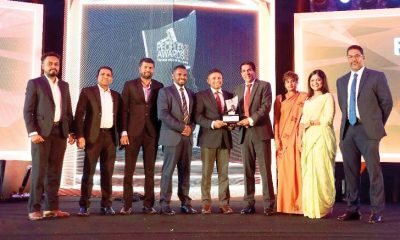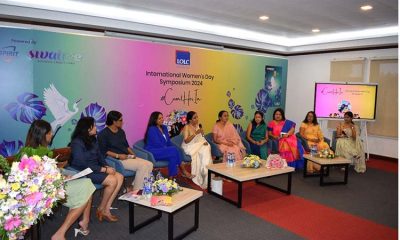Business
HydroGraph ties up with LOLC Advance Tech to tap $47 B market

LOLC Advance Technologies Private Limited (LOLC AT), a wholly owned subsidiary of LOLC Holdings PLC and HydroGraph Clean Power Incorporation, a commercial manufacturer of high-quality graphene, have recently entered into a Letter of Intent (LOI) to commercialize a jointly developed graphene blend that has shown significant improvements in battery performance.
Through a collaborative effort with the Sri Lanka Institute of Nanotechnology (SLINTEC), LOLC AT, holds a controlling stake in Ceylon Graphene Technologies (CGT), through which the group engage in graphene related research, innovations and undertakings over the years.
Under the terms of the LOI, LOLC AT and HydroGraph will work together to scale up production of the graphene blend and bring it to the market. The partnership will centre around a novel composite graphene blend that improves the charge acceptance of lead acid batteries by 47%. With such stellar game-changing results, HydroGraph and LOLC AT agreed to commercialize this product and pursue the lead acid battery market, projected to be worth more than $47 billion by 2030, driven in part by electric vehicle dependency on the product. The partnership will leverage their expertise in graphene production to accelerate commercialization and drive adoption of the technology. The blend incorporates a unique combination of graphene and other carbon-based materials, resulting in an electrode with enhanced electrical conductivity, stability and durability.
“We are excited to partner with HydroGraph to bring this game-changing technology to the market,” said Danesh Abeyrathne, Chief Executive Officer of LOLC Advanced Technologies. “This partnership demonstrates our commitment to investing in cutting-edge technologies that have the potential to transform industries and drive economic growth.
“LOLC as one of the most diversified multinational conglomerates in Sri Lanka, has been investing in advance technologies for the past many years. This partnership with HydroGrpaph represents a significant milestone in the development of graphene-based materials for commerAcial applications in endorsing our potentiality across the international arena. I believe our combined expertise and resources will now enable us to scale up production and bring this technology to the market, unlocking its capability to revolutionize the battery industry.”
For more than six months, HydroGraph and CGT have collaborated on exploring the potential applications of combining their materials. As a result, the combined graphene products now possess enhanced and distinctive properties. Moving forward, HydroGraph and CGT aim to further advance the development of other applications for this composite graphene blend across various markets. This LOI is a significant step in HydroGraph achieving its ambitious commercialization goals for 2023, driven by a meticulous business development strategy that prioritizes the development of applications and establishing customer trust in the highest quality graphene available in the market.
Mr. Manju Gunewardene, Chief Executive Officer, CGT stated, “When we were first introduced to HydroGraph’s graphene, we immediately recognized that combining it with CGT Reduced Graphene Oxide (RGO) would result in a unique and enhanced graphene product. Our belief was validated through extensive R&D and application work conducted at CGT’s advanced laboratories, CGT is thrilled to be at the forefront of this groundbreaking partnership, and the company is confident that the joint venture will result in a game-changing product that will transform the graphene market.”
Commenting on the partnership, Mr. Stuart Jara, Director/ Chief Executive Officer of HydroGraph stated, “The work HydroGraph and CGT have done together and the LOI show the power of our strategy, and the importance of leveraging different but complementary competencies that each party brings to the partnership. We will continue to leverage this association to explore other applications; this is a big step in the process of bringing the highest quality and most cost-effective graphene to the world.”
In the upcoming months, HydroGraph and LOLC AT will work on finalizing the complete partnership framework. Meanwhile, CGT will conduct all necessary tests and analysis on the product, including the development and testing of lead acid batteries using the composite graphene blend of HydroGraph’s fractal graphene and CGT’s reduced graphene oxide. HydroGraph will take charge of leading and organizing the sales and marketing of the combined graphene product in the global lead acid battery market and other potential commercial applications.
Business
Dialog delivers strong growth, stronger national contribution in FY 2025
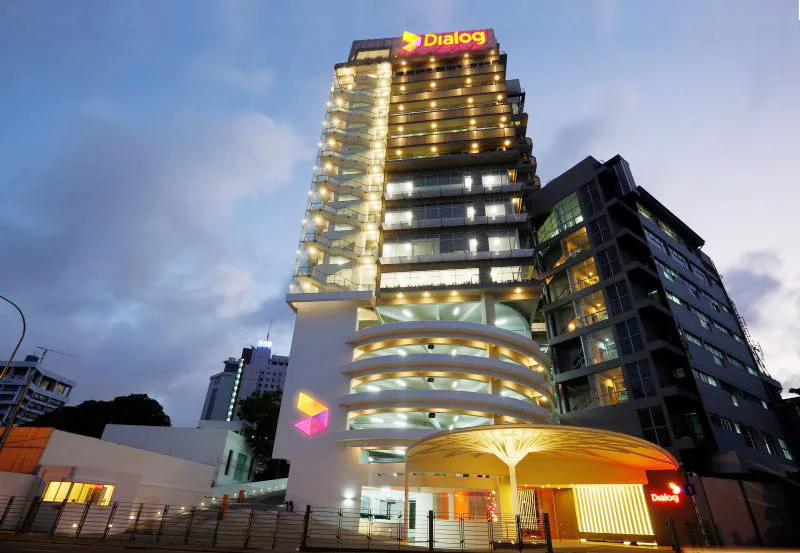
Dialog Axiata PLC announced, Friday 6th February 2026, its consolidated financial results (Reviewed) for the year ended 31st December 2025. Financial results included those of Dialog Axiata PLC (the “Company”) and of the Dialog Axiata Group (the “Group”).
Group Performance
The Group delivered a strong performance across Mobile, Fixed Line and Digital Pay Television businesses recording a positive Core Revenue growth of 16% Year to Date (“YTD”). Group Headline Revenue reached Rs179.6Bn, up 5% YTD, despite the continued strategic scaling down of low-margin international wholesale business. In Q4 2025, Revenue was recorded at Rs46.5Bn up 2% Quarter-on-Quarter (“QoQ”) and 2% Year-on-Year (“YoY”).
The Group Earnings Before Interest, Tax, Depreciation and Amortisation (“EBITDA”) reached Rs86.0Bn up 30% YTD supported by Core Revenue performance and Cost Rescaling Initiatives. On a QoQ basis Group EBITDA demonstrated a modest growth to record at Rs23.0Bn up 2% QoQ with an EBITDA margin of 49.5% in line with the Revenue performance. Group EBITDA margin reached 47.9% for FY 2025, up 9.2pp.
Group Net Profit After Tax (“NPAT”) reached Rs20.8Bn for FY 2025, up 67% YTD mainly resulting from robust EBITDA growth, despite higher tax and net finance costs. Normalized for forex impact, NPAT growth was recorded at +>100% YTD to reach Rs22.1Bn. On a QoQ basis NPAT grew 3% to reach Rs5.9Bn resulting from strong EBITDA performance.
On the back of strong operational performance, the Group recorded Operating Free Cash Flow (“OFCF”)
of Rs49.3Bn for FY 2025 up >100% YTD.
Dividend Payment to Shareholders
In line with the dividend policy and financial performance of the Group and taking into account the forward investment requirements to serve the nation’s demand for Broadband and Digital services, the Board of Directors of Dialog Axiata PLC at its meeting held on 6th February 2026, resolved to propose for consideration by the Shareholders of the Company, a dividend to ordinary shareholders amounting to Rs1.50 per share. The said dividend, if approved by shareholders, would translate to a Dividend Yield of 5.0% based on share closing price for FY 2025. The dividend so proposed will be considered for approval by the shareholders at the Annual General Meeting (AGM) of the Company, the date pertaining to which would be notified in due course.
Company and Subsidiary Performance
At an entity level, Dialog Axiata PLC (the “Company”) continued to be the primary contributor to Group Revenue (76%) and Group EBITDA (74%). Aided by sustained growth in the Data segment and cost-rescaling initiatives, Company revenue was recorded at Rs135.8Bn for FY 2025, up 18% YTD, EBITDA rose 32% YTD to reach Rs63.6Bn. On a QoQ basis, Q4 2025 Revenue was recorded at Rs34.8Bn, down 1% QoQ due to a reclassification of Hubbing Revenue, while EBITDA decline 1% QoQ to record Rs17.0Bn, largely attributable to network restoration costs and donations made in relation to the Cyclone Ditwah relief efforts. Furthermore, NPAT was recorded at Rs15.6Bn for FY 2025, up 41% YTD. Normalised for forex impacts, the company NPAT was up +>100% YTD to reach Rs17.0Bn. On a QoQ basis, Company NPAT was recorded at Rs4.5Bn, down 6% QoQ.
Business
Ceylinco Life’s Pranama Scholarships reach 25-year milestone
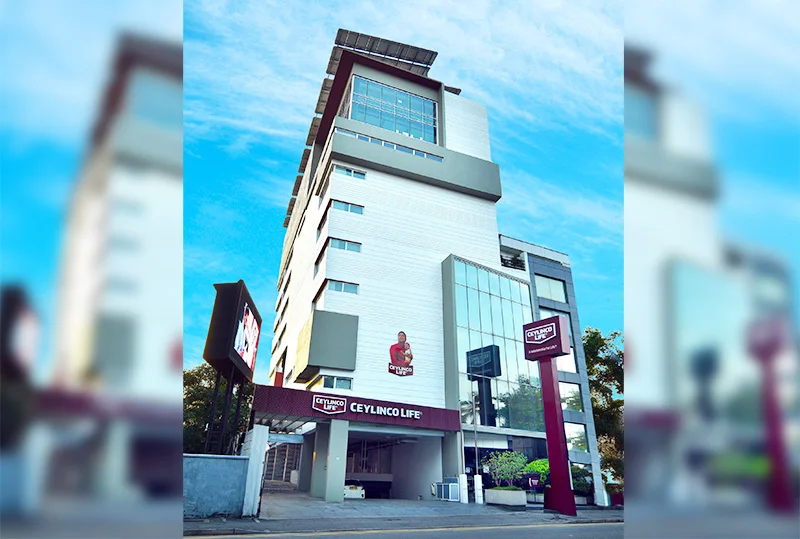
Ceylinco Life has announced the launch of the 25th consecutive edition of its flagship Pranama Scholarships programme, marking a significant milestone in the company’s long-standing commitment to recognising and rewarding excellence among the children of its policyholders.
Under the 2026 programme, the life insurance market leader will present scholarships with a total cumulative value of Rs. 22.7 million, continuing a rewards initiative that has now been conducted without interruption for a quarter of a century. Since its inception, the Ceylinco Life Pranama Scholarships programme has benefitted 3,466 students across the country, representing a total investment of Rs. 240 million in nurturing academic achievement and outstanding performance in sports, arts and other extracurricular pursuits.
Business
Sri Lankans’ artistic genius glowingly manifests at Kala Pola ‘26

The artistic genius of Sri Lankans was amply manifest all over again at ‘Kala Pola ‘26’ which was held on February 8th at Ananda Coomaraswamy Mawatha Colombo 7; the usual, teeming and colourful venue for this annual grand exhibition and celebration of the work of local visual artists.
If there is one thing that has flourished memorably and resplendently in Sri Lanka over the centuries it is the artistic capability or genius of its people. It is something that all Sri Lankans could feel a sense of elation over because from the viewpoint of the arts, Sri Lanka is second to no other nation. With regard to the visual arts a veritable dazzling radiance of this inborn and persisting capability is seen at the annual open air ‘Kala Pola’.
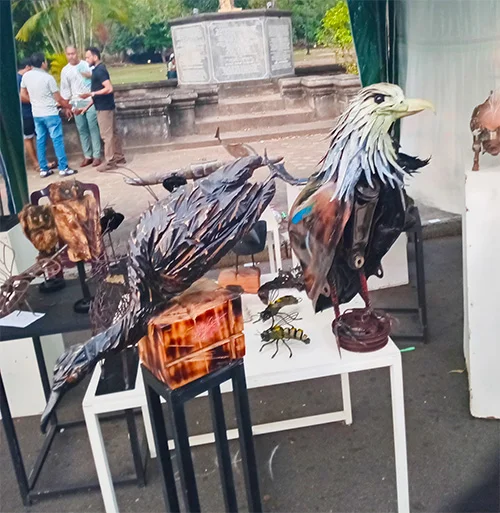
A bird of Sri Lanka created from scraps of iron waste.
All capable visual artists, wherever they hail from in Sri Lanka, enjoy the opportunity of exhibiting their work at the ‘Kala Pola’ and this is a distinctive ‘positive’ of this annual event that draws numberless artists and viewers. There was an abundance of paintings, sketches and sculptures, for instance, and one work was as good as the other. Ample and equal space was afforded each artist. Its widely participatory and open nature enables one to describe the exhibition as exuding a profoundly democratic ethos.
Accordingly, this time around at ‘Kala Pola ‘26’ too Sri Lankans’ creative efforts were there to be viewed, studied and enjoyed in the customary carnival atmosphere where connoisseurs, local and foreign, met in a sprit of camaraderie and good cheer. Many thanks are owed once again to the George Keyt Foundation for the presentation of the event in association with the John Keells Group and the John Keells Foundation, not forgetting the Nations Trust Bank, which was the event’s Official Banking Partner. The exhibition was officially declared open by Chief Guest Marc-Andre Franche, UN Resident Coordinator in Sri Lanka.
By Lynn Ockersz
-

 Features3 days ago
Features3 days agoMy experience in turning around the Merchant Bank of Sri Lanka (MBSL) – Episode 3
-

 Business4 days ago
Business4 days agoZone24x7 enters 2026 with strong momentum, reinforcing its role as an enterprise AI and automation partner
-

 Business3 days ago
Business3 days agoRemotely conducted Business Forum in Paris attracts reputed French companies
-

 Business3 days ago
Business3 days agoFour runs, a thousand dreams: How a small-town school bowled its way into the record books
-

 Business3 days ago
Business3 days agoComBank and Hayleys Mobility redefine sustainable mobility with flexible leasing solutions
-

 Business4 days ago
Business4 days agoHNB recognized among Top 10 Best Employers of 2025 at the EFC National Best Employer Awards
-

 Business4 days ago
Business4 days agoGREAT 2025–2030: Sri Lanka’s Green ambition meets a grid reality check
-

 Editorial6 days ago
Editorial6 days agoAll’s not well that ends well?


